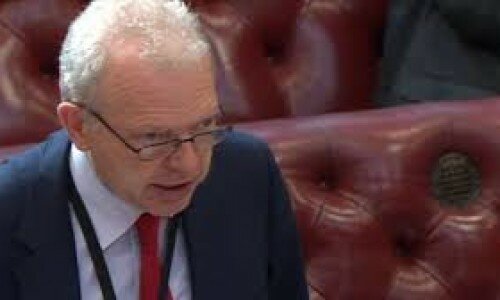
Labour peer slams ‘unwanted distraction’ of all-out Birmingham council elections
Reducing the number of city councillors and switching to all-out elections will be an unwanted distraction and shift attention away from tackling Birmingham’s “very significant problems”, a senior shadow minister has warned.
Lord Hunt of Kings Heath feared councillors would end up focusing on secondary issues around boundary reviews rather than dealing with the many shortcomings outlined in the Kerslake Review.
Speaking in a House of Lords debate into Government plans to move the city council from elections by thirds to all-out elections from 2018 and to consider reducing the size of the council, Lord Hunt said it was difficult for 120 councillors to represent a population of a million people and the problems would be even worse if the size of the authority was cut to 100.
Lord Hunt, a former minister and Birmingham councillor, is Labour’s Home Affairs spokesman in the Lords and shadow deputy leader of the Lords.
The debate was noticeable for cross-party agreement about the severe challenges facing Birmingham city council. Lord Hunt, Lord Rooker, a former Birmingham Labour MP, and Tory local government minister Lord Ahmad all said they accepted the failings identified by Kerslake.
The identified poor leadership at the council going back many years, lack of any coherent strategic vision and a tendency to sweep difficult issues under the carpet.
Lord Hunt began his speech by stating:
I have lived in Birmingham for nearly 40 years. It is a wonderful city—very vibrant and friendly—but it faces a number of real challenges at the moment. Its economy has underperformed compared with London, Manchester, Liverpool and Sheffield over many years now.
Birmingham has a great history, great strengths and potentially has a great future but a lot of that depends on the city council and the quality of leadership it provides. At the moment, it is fair to say that it is being held back by a number of very significant problems.
Children’s services have been rated inadequate or worse for a number of years now. The Trojan horse incident raised a lot of serious issues about the education service in general and about the city council’s engagement and understanding of its local communities.
Its financial position, following the equal pay debacle, can be described at best only as horrendous.
He added that Kerslake had identified “mega challenges” in the council’s “leadership and partnership approach as well as in how it operates, the services it provides and the skills of its people”.
He feared the current Boundary Commission investigation into the future shape of the council meant that councillors’ attention “will not be on these core issues of leading Birmingham out of the very difficult situation that it is in”.
Lord Rooker believes Birmingham city council is too large to be effective and wants the authority to be split into three or four borough councils.
He also stressed the reputational damage being inflicted on Birmingham:
When I attended the Labour Party conference last year…. I went to every single fringe meeting dealing with urban affairs and city growth. I concentrated on that because I knew what would happen.
Not once at any meeting I went to was the word ‘Birmingham’ uttered as an example of what was being done as a beacon for others. It was always several other examples of cities in the country on various issues. The Birmingham leader knows this to be true because he sat alongside me for the whole of one of those meetings.
Lord Rooker said he would “embrace” the move to all-out elections as well as converting 40 three-member wards to 105 single member wards.
Lord Ahmad set out the problems facing Birmingham which he said were serious. Fundamental reform was essential and needed to be driven forward as quickly as possible.
The challenges they face are deep-rooted and there are serious problems that they need to face up to, such as an under-performing economy, poor local services in certain respects and no credible plans to address the council’s very significant budget difficulties. That England’s second city faces such challenges is something that should concern us all.
We believe that the change to the election cycle in Birmingham is critical to securing the fundamental reforms that the city needs. The current pattern of elections by thirds has not helped Birmingham’s ability to take strategic decisions.
There is, as we all recognise, an inability to focus on the longer-term problems that are holding the council back, including transforming services.
Similar Articles
PM: gave unlawful advice; frustrated Parliament
"Scenes." As young people would say, writes Kevin Johnson. "Unlawful." "Unequivocal." "Historical." These words are not,
WMCA: Nothing to see here…move along
As the Prime Minister prepared to address leaders ‘up North’ gathering for the Convention of
HS2: new driver needed
Is the Oakervee Review "welcome", "frustrating" or the end of the line for HS2, asks
Dawn goes Down Under
It might appear that Birmingham city council changes its chief executives more regularly than its
Hezza: Give Metro Mayors greater powers to deliver housing, skills and jobs
Britain’s metro mayors should be given greater powers over housing, schools and jobs to truly










